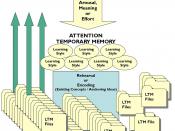Some psychologists suggest that cognitive development is not in a stage-like manner.
From the information-processing approach, if we view cognitive development as the acquisition of several separate information processing skills, we would notice that a child may need several cognitive skills like attention and memory, apart from the critical skills which symbolyses the stages, to successfully do the tasks designed to test the critical skills.
For example, in the study of object permanence, when an infant is shown a toy that is then hidden or covered while they watch, they do not act like they think the toy still exists, since they have no attempt to look for it. However, we should note that this task requires not only object permanence, but also attention (for paying attention to the toy), memory (for remembering where the toy was) and the physical ability to act like finding the toy.
Since the component skills develop at different rates, cognitive development may seems to be discontinuous, because children may actually have the ability being tested but be unable to perform the task since they lack one of the other required skills.
So, the reason why Piaget think that cognitive development is in a stagelike manner is that he has failed to separate the skills which he wanted to test from the other required skills when he designed the task for his stage theory. Thus, there is a possibility that he might have underestimated children's abilities.
From the knowledge acquisition approach, some claim that children and adults have the same cognitive processes and capacities. The major difference between them is the adult's more extensive knowledge base. That means the adults have a larger collection of fact to base on and a deeper understanding on how to organize facts in a particular domain.
In an experiment, we compare a group of 10-year-old chess experts with a group of 18-year-old chess amateurs. The 18-year0olds outperformed the 10-year-olds in a memory test on random numbers. But the 10-year-old chess experts did better than the 18-year-old chess amateurs when they are asked to recall the positions of the chess pieces on the board. This shows that the domain-specific knowledge is the main difference between the two groups which affect their cognitive abilities, but not the stages of cognitive development.
These two approaches provide evidence why cognitive development may not conform to a stage view.



Stage theory
These are some valid criticisms of Piaget's stage theory, but not enough for a balanced essay.
2 out of 2 people found this comment useful.